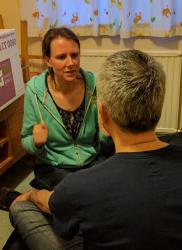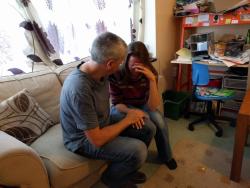An introduction to Listening Partnerships: how being listened to, and listening to others, helps us to live the life we want!!
How often do you feel truly listened to? Where is your space to say exactly what you are thinking without being judged on any of it? Where can you cry or vent or even laugh about your troubles without anyone trying to fix anything for you? We all build relationships in our lives which hopefully support us through the hard times, but sometimes we need some time and space to really delve into what is going on for us - without interruption, without being given advice, and without feeling like we have to hold back for the sake of our listeners. This is what Listening Partnerships bring to our lives.
Before you get stuck into this article, you might like to watch a very brief video on what LPs are about here.
A practical tool to support our parenting
Listening Partnerships are one of the cornerstone Hand in Hand Parenting Tools. The other 4 tools, which we will look at in future posts, are all for an adult to use with a child, but Listening Partnerships, or LPs as you will often see them referred to, are specifically an adult-to-adult tool. We use them to work on deep-seated feelings which underlie our behaviours - feelings which might include frustrations, worries, fears and, importantly, past hurts.

How to start
When we are just starting out with LPs, or if we get a new Listening Partner at any time, a good place to start is by telling our life story, little by little, from as early as we remember. During these early sessions, all we are really trying to do is to build safety - perhaps a feeling of ’testing out’ our Listening Partner: ‘If I say this, what will their reaction be?’ - and hopefully finding that everything we say is met with warmth and understanding and acceptance. This way, we can touch on things that have been hard for us (but perhaps without going too deep at this early stage, if we are not yet ready), and we can activate for ourselves some of our own memories which might be tucked away. As we talk, it is important to notice where some feelings start to bubble up for us - we can just mentally note these, and come back to them in future sessions when we are ready to see what is going on for us in those areas.
So far, I have described using our LPs to talk - but this is just skimming the surface. What we are eventually trying to do with LPs is to get to the feelings underneath our spoken words. This can seem incredibly uncomfortable at first! We are not a culture that recognises or values the importance of truly feeling our emotions, so purposely bringing them to the surface seems very counterintuitive. But when we understand that our brains and bodies are designed to feel and express all emotions, even uncomfortable ones - that in fact it is our highly effective way of working through trauma or hurt and then being able to leave it behind - we become more at ease with deliberately seeking out those emotions and letting them be seen in these safe and confidential situations.
When it feels hard
Now, for anyone feeling really icky about all this right now - I am totally with you! I come from a family where even joyful emotions tended to be seen as ‘a bit much’, and where the more uncomfortable emotions were clamped down on, distracted from, or otherwise made to go away. My parents did what they knew, what was passed down to them from previous generations, and I am very grateful for all they have done for me, but if they had known then what the brain science tells us now, I am quite sure they would have attempted to handle things differently in some areas! Anyway, learning to delve deeply into these challenging feelings has been a HUGE journey for me, but it has been so so worth it - so please, give it a try and know that you’re not alone if you find it a difficult and uncomfortable process at first!
The reason we want to get to the emotions and really feel them fully, really express them, is because emotions that are stuck in our emotional brain (our limbic system) and bodily system will tend to block our good thinking. If we have experienced a hurt or trauma in the past, and weren’t, for whatever reason, allowed to fully express that hurt, that trauma, in the moment, we then carry those feelings around with us. Mostly, they are pushed down, with the lid screwed tightly on, but if something reminds us in some way of that past hurt, the pressure becomes too much and we are immediately transported back to that event in terms of our feelings, and those feelings want to be released! Often as parents, we are activated (i.e. our buttons are pushed) by the things our children do, and that’s when we blow. But if we really think about it, how many of our children’s behaviours really warrant the reaction we sometimes give to them? This is no slur towards our own efforts - we are all doing our best, and usually with little support, and it is natural that we will lose our cool at times - but if we can change things so that those incidents don’t fire us up, wouldn’t we want to look to do that? And that’s where LPs are so so helpful - they allow us, at an appropriate time, to really feel the emotions we ‘should’ have felt in the past, so that we can let them go, move on, and can be less (or no longer) activated by what bothers us in our lives. In doing this, we can lay down new brain pathways, so that we are not stuck in the same old reactions, the same old conditioning that has been producing reactions in our parenting (and in our lives) that we just don’t want. Often, our ingrained brain patterns are of no use to us, are not serving us, but if we don’t change how we feel about the things that trigger us, it’s incredibly hard to change how we react to them as well.
Imagine, for example, that every time my child whines, I bristle and get snappy. Is whining hurting anyone? Is it life-threatening? No, of course it isn’t - my rational brain knows that, but my emotional brain/body system is still firing up to stand up to this threat of whining. Why? Well, it’s quite likely that whining wasn’t handled with compassion when I was a child. Knowing more about how the brain works, means we can understand that whining is a call for connection, a cry for help, from a child who is stuck and doesn’t know how to move forwards. We can know it, but because whining was addressed with frustration, disappointment, snappiness, or worse when we were a child, our brains only really know those reactions as a possible response to our child’s behaviour. So, I can use my LPs to talk about how my child’s whining makes me feel, and I can shout at ‘my child’ (my Listening Partner stands in) to stop, I can cover my ears, stamp my feet… Whatever I need to do to take some of the heat out of it for me. But to really address my feelings, I need to go back, recognise what my own inner child needed when she was whining all those years ago, and vent or grieve about that need not being met for me at that time. After doing those sorts of explorations in my LPs, when my child comes whining to me, I can feel their current pain (rather than my own, old pain), and move to address what is causing the whining with empathy, and without being activated into a reaction myself. It might take one good LP session, or it might take a good number of sessions, to address an issue to a point where it no longer bothers us, but we can get there.
If you’d like some more support with keeping your own calm, you can get a free download on just that, here.
The power of listening

So, why is just listening to someone so powerful? What’s our purpose if we don’t give them advice to get them to where they need to be? Again, as we start to understand more about how the brain works to relieve itself of stresses and tensions and hurts, the role of the listener becomes much clearer. Feeling our emotions fully - or even just a little bit! - can be very scary. It can feel like they’re never going to stop, and it can feel like people will think less of us if we express ourselves in whatever way we need to. We need someone with us who can warmly hold the space, without judgement, and who is quietly holding the fact that it will be ok, and that everyone is safe right now. These upsets we are feeling stem from past hurts, but right now, we are safe, and our listener knows it, even when we can’t know it for ourselves. And as our brains work best when they are feeling safe and connected, just having someone by our side as we work through whatever is hard for us is immensely valuable - and can help us tap into the answers that we have inside, so that we can figure out our problems ourselves, and then move forwards.
And a little, but wonderful, extra upside to being a listener - suddenly, we are doing an incredible service for someone, being immensely useful, really providing something of such great value. And the sense of self worth that this brings to us is so powerful, so necessary - we are really really helping someone, and we are doing it by supporting them to find their own inner strength, their own answers, and it’s really something when you realise that it’s you doing that! Do not underestimate your value and importance as the listener in this exchange. It feels to me like our listener is our ‘misplaced’ inner voice. When we are born, we are born with a sense of goodness, of ‘knowing’ that we are good, that we deserve to be here in this world, and that we have a right to be loved and cared for by others. In short, we love ourselves. But gradually we lose this sense of our ‘right’ to be here, of our self love, and when we talk to ourselves it is with a negative inner voice, that points out to us all that we are doing wrong, all that we are that is not good enough. So our listener brings us back to that warm, caring inner voice, becomes that inner voice - that voice that quietly whispers, through their mere presence, that we are worth it, that we are good, that we are enough just as we are. And as we are listened to in this way, over time, our true inner voice, the one that knows we are worthy, that we are always doing our best, gets a little louder, until we start to hear it more and more inside of us, and to recognise the goodness that we are and that we do. And if that’s not a powerful reason to listen to someone with warmth and without judgement - even if we do feel a bit redundant that we’re not allowed to give advice! - I don’t know what is.
How it works
So to finish, here is a real-life example from my own experience, of how LPs helped me work on my feelings of not being deserving - we were a long way down our LP path by this point, and I often know what I need from my partner, and in this instance I asked her to do certain things for me that I thought would help me to get to my horrible feelings of discomfort! I hope it helps to illustrate what we have been discussing above - and do have a look at the links below for further information about how to find a Listening Partner, and for more guidelines for how to set one up and carry it out.
I have recently realised that I am really really awful at accepting compliments - I tend to shrug it off and do a sort of ‘Yes well, it’s only because…’ sort of response, sort of like I’m making an excuse for whatever it is I have done well. It must be a really thankless task trying to tell me something nice!!
During my turn in our parent support group, I’d been talking a bit about how I find it difficult in Listening Partnerships to accept the compliments that we often hear - things like ‘You’re a great mum’ or ‘You’re working so hard for your children’. I suspect that self-congratulation wasn’t looked on very favourably in my childhood - I can’t speak for other cultures, but it feels like in the UK, blowing your own trumpet is seen as boasting and not really the done thing.
I decided to take the initiative and asked my upfront Listening Partner to pay me some compliments so that I could practise my response (even asking her to do it was hard!!). I started by just trying to say ‘Thank you, that’s really nice to hear’ - it felt so wrong, and I really cringed and had to jump up and shake my body in disgust to try to get the yucky feeling off and we all laughed and laughed about it! I tried that a few times and it got a tiny bit easier, and then I decided to try responding to it by saying, in a joking way, something really over the top, like ‘Oh yes, I’m AMAZING!!!!’ We all laughed a lot again, and I did that a few times. I didn’t feel it was as useful as trying a genuine ‘Thank you’, but I was glad I tried it, and it did make me laugh a lot at how ridiculous it sounded. It made me feel as if maybe I downplay it when I’m complimented, because I really don’t want to sound like that ‘Oh yes, I’m amazing’, boastful sort of person! But at the moment I go much too far the other way, and put myself down, as I don’t really believe that I am doing anything well enough to deserve a compliment! We finished by me trying to genuinely say ‘I am a good mother’ - i.e. giving myself a compliment - which wasn’t quite as bad as I thought, and certainly not as bad as hearing someone else say it and having to respond appropriately!
I plan to do more on this in future Listening Partnerships, but I feel like I made a big step forward in just recognising how difficult I find it, and hearing how I would like to sound for real after a bit of practice!
Further information on listening and Listening Partnerships:
-
For more detail, get this comprehensive booklet: Listening Partnerships for Parents - I would highly recommend getting this (if not the whole booklet set!), as each time I come back to it it helps me a little more with developing my LP skills - a ‘must read’!
-
Or of course if you want to find out about other elements of the Hand in Hand approach, I recommend getting the whole set which is great value (and includes the Listening Partnerships booklet): Parenting by Connection booklet set and bonus materials - There is also a self-guided, online class on LPs, which you might want to check out - I’ve done it, and it is extremely helpful in getting the most out of your LPs: Building a Listening Partnership
-
A short video with a brief Introduction to LPs - and this might be a great way to share this amazing tool with others if you are called to!
- The self-explanatory What is a Listening Partnership and why do I need one?
- For more on Listening Partnerships - what they are, and how to do them - try 10 tips for being a good listener
- And now you just need How to find a listening partner!!
Emilie Leeks
AuthorEmilie is a heart-centred life mentor and space holder, supporting those on a healing path. This is not an easy journey, and often we can find ourselves losing our way. Emilie's work meets you where you're at, with beautiful, accepting support and connection, and weaves that support with practices and explorations in self-compassion, body connection, and a return to a deep trust in ourselves. Note: all blog post content which refers to them, has been read and agreed to by Emilie's children.
View All Posts